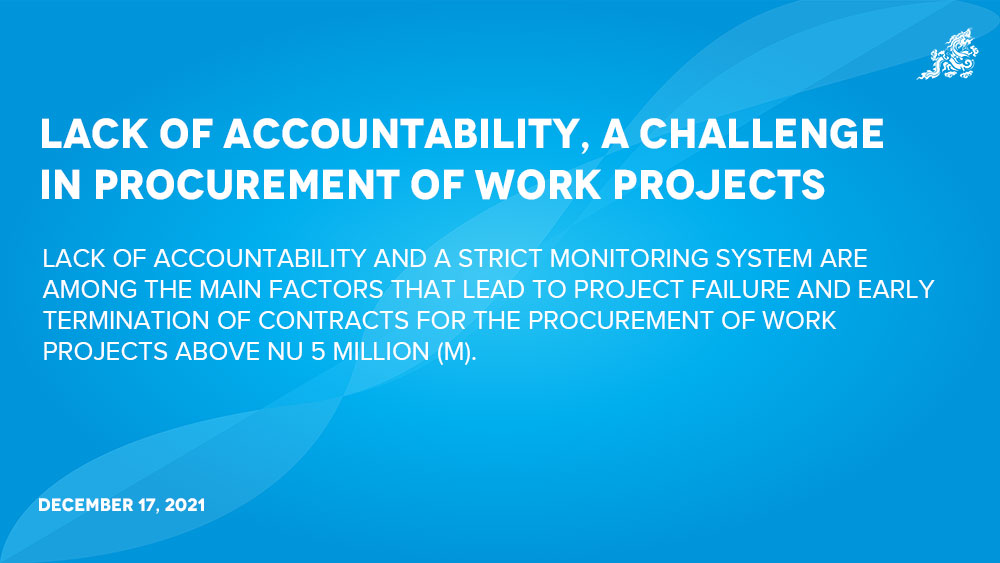Thukten Zangpo
Lack of accountability and a strict monitoring system are among the main factors that lead to project failure and early termination of contracts for the procurement of work projects above Nu 5 million (M).
This is according to “Issues and Gap Analysis in the Public Procurement of Works (above 5M); Contract Implementation, and Settlement of Disputes”, a report from the Office of Attorney General finance and corporate division.
Although relevant laws governing government procurement and contracts are in place, they are often not implemented properly both by procuring agencies and contractors, it stated.
The report also pointed out that project failures have a direct link to lack of competency and know-how, motivation, and integrity of personnel directly involved in the implementation.
“When such a project fails, it leads not only to financial loss but also delays in making public facilities available to the public,” it stated.
The procurement of work projects above 5M includes significant projects such as roads and bridges, which constitutes infrastructure development in the country.
Nu 109 billion (B) was allocated as procurement budget (works, goods, and services) in the 11th Five Year Plan (FYP) which grew to Nu 116B 12th FYP, accounting for 15 percent of the country’s Gross Domestic Product.
The report found that most of the failures in the contract implementation were due to improper and unrealistic planning during pre-awarding of the project.
It recommended the procuring agencies to carry out proper planning such as pre-feasibility studies, market research and analysis, prepare detailed project reports, determine realistic project timelines, verify adequacy of budget, and provide appropriate technical specifications.
To award projects to the best-evaluated bid, the report recommended the need to re-evaluate terms such as “lowest evaluated bid” in the Procurement Rules and Regulations 2019.
“Selecting the right bid and the bidder ensures that works are completed timely with desired specifications,” it stated.
Currently, there is no proper closure or accountability by submitting a report on the same after the procurement of works is carried out and the contract is completed or terminated.
The report recommended strictly imposing administrative actions according to the Bhutan Civil Service Rules 2018 if the procurement officer or responsible personnel fails or neglects in performing their specific roles.
It also recommended the Royal Civil Service Commission protect hardworking and diligent civil servants who are unfairly transferred for not adhering to his or her supervisor’s instructions, even though he or she was executing his or her responsibilities diligently.
The report found the need to develop a national guideline or manuals, especially for personnel directly involved in the implementation of works for effective monitoring of works from the inception until the end of a project.
According to the Annual Audit Report 2020, out of six categories of irregularities, the highest (Nu 1.574B) was attributable to the shortfall, lapses, and deficiencies, followed by non-compliance to laws and rules at Nu 0.408B.


